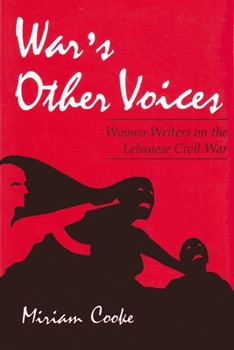War's Other Voices: Women Writers on the Lebanese Civil War
(Part of the Gender, Culture, and Politics in the Middle East Series)
Select Format
Select Condition 
Book Overview
This book challenges the assumption that men write of war, women of the hearth. The Lebanese war has seen the publication of many more works of fiction by women than by men. Miriam Cooke has termed these women the Beirut Decentrists, as they are decentered or excluded from both literary canon and social discourse.
Although they may not share religious or political affiliation, they do share a perspective which holds them together. Cooke traces the transformation in consciousness that has taken place among women who observed and recorded the progress towards chaos in Lebanon. During the so-called "two year" war of 1975-76 little comment was made about those (usually men in search of economic security) who left the saturnalia of violence, but with time attitudes changed. Women became aware that they had remained out of a sense of responsibility for others and that they had survived. Consciousness of survival was catalytic: the Beirut Decentrists began to describe a society that had gone beyond the masculinization normal in most wars and achieved an almost unprecedented feminization. Emigration, the expected behavior for men before 1975, became the sin qua non for Lebanese citizenship. The writings of the Beirut Decentists offer hope of an escape from the anarchy. If men and women could espouse the Lebanese women's sense of responsibility, the energy that had fueled the unrelenting savagery could be turned to reconstruction. But that was before the invasion of 1982.Format:Paperback
Language:English
ISBN:0815603770
ISBN13:9780815603771
Release Date:August 1996
Publisher:Syracuse University Press
Length:216 Pages
Weight:0.75 lbs.
Dimensions:0.6" x 6.0" x 9.0"
Related Subjects
Asia Criticism & Theory History History & Criticism Lebanon Literary Criticism Literary Criticism & Collections Literature & Fiction Middle East Modern (16th-21st Centuries) Movements & Periods Politics & Social Sciences Social Science Social Sciences Women in History Women's Studies World World LiteratureCustomer Reviews
0 rating





